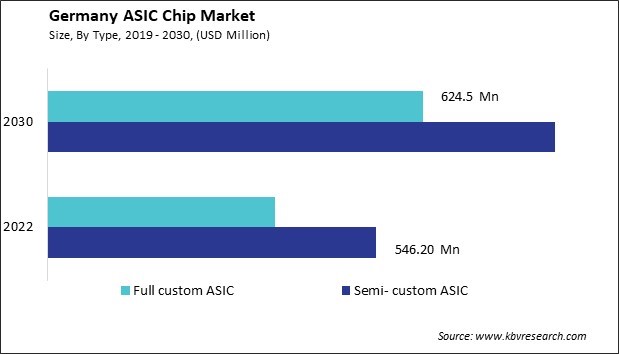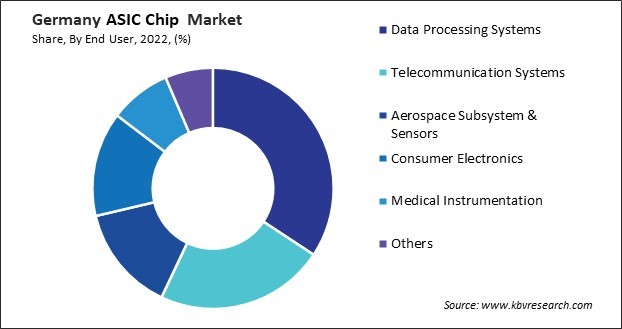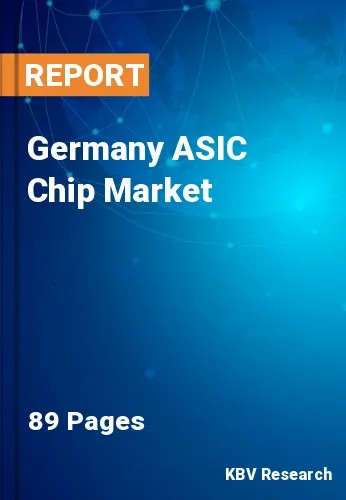The Germany ASIC Chip Market size is expected to reach $1.8 billion by 2030, rising at a market growth of 6.3% CAGR during the forecast period.
The ASIC chip market in Germany has witnessed significant growth and evolution. As one of the leading economies in Europe, Germany boasts a robust technology sector and a strong industrial base, contributing to the demand for ASIC chips across various industries. Germany's automotive industry stands out as a major driver of the ASIC chip market. With the rise of electric and autonomous vehicles, the demand for advanced semiconductor solutions, including ASIC chips, has surged. German automotive manufacturers and suppliers rely on ASIC chips to enhance their vehicles' performance, safety, and efficiency, driving the adoption of ASIC technology in the automotive sector.

Moreover, Germany's thriving industrial automation sector fuels the demand for ASIC chips in control systems, sensors, and machinery. The telecommunications and networking segment also represents a significant industry opportunity for ASIC chip providers in Germany. With the deployment of 5G networks and the ongoing expansion of broadband infrastructure, there is a growing need for ASICs designed for high-speed data processing, packet switching, and network security.
Furthermore, Germany's leadership in renewable energy drives the demand for ASIC chips in solar inverters, wind turbines, and smart grid solutions. ASICs contribute to optimizing power generation, distribution, and management, enhancing the efficiency and reliability of renewable energy systems. As the country transitions towards sustainable energy sources, the demand for ASICs tailored for renewable energy applications is expected to grow further.
The COVID-19 pandemic has presented challenges and opportunities for the ASIC chip market in Germany. The global supply chain disruptions and economic uncertainties have impacted semiconductor manufacturing and distribution, leading to supply shortages and delays. The sudden shift to remote work and online learning has also increased the demand for consumer electronics, putting additional pressure on semiconductor suppliers to meet industry demand in Germany.
The adoption of renewable energy in the ASIC chip market in Germany has witnessed a significant surge in recent years. Germany, known for its ambitious renewable energy targets and robust technological infrastructure, has become a focal point for companies aiming to integrate sustainability into their operations, including semiconductor manufacturing. One of the primary drivers behind the increasing adoption of renewable energy in the ASIC chip market is the growing global awareness of climate change and the need to reduce carbon emissions. As a result, businesses across various industries in Germany are under pressure to minimize their carbon footprint and transition towards cleaner energy sources.
Germany's commitment to renewable energy further catalyzes this transition. The country has set ambitious goals to significantly increase the share of renewable energy in its total energy consumption. Policies like the Renewable Energy Act (EEG) provide financial incentives for businesses to invest in renewable energy infrastructure, including solar, wind, and biomass.
According to the International Trade Administration, Germany has set ambitious targets to source 80% of its energy from renewables by 2030. As of 2022, the country has made notable advancements, reaching 46% of this target. Renewable energy accounted for a significant 42.3% portion of the domestic energy blend. Similarly, the ASIC chip market has a growing trend towards embracing renewable energy sources, mirroring Germany's progress in the energy sector.
Furthermore, advancements in renewable energy technologies have made them more reliable and cost-effective. Solar panels, for instance, have seen a dramatic decrease in cost, making solar energy a competitive alternative to traditional fossil fuels. Therefore, Germany's embrace of renewable energy, driven by environmental concerns and supported by robust policies and technological advancements, propels the ASIC chip market towards a greener and more sustainable future.
In Germany, the ASIC chip market is experiencing a surge in demand for enhanced security solutions, driven by escalating concerns over data breaches, cyber threats, and privacy infringements. One key factor fueling the demand for enhanced security solutions in ASICs is the pervasive nature of cyber threats. With the proliferation of interconnected devices and the advent of Industry 4.0, there's a growing recognition that traditional security measures are no longer adequate to safeguard sensitive data and critical infrastructure. As a result, there's a heightened emphasis on integrating sophisticated security features directly into ASICs to fortify the overall system against malicious attacks.
Furthermore, stringent regulatory requirements, such as the GDPR (General Data Protection Regulation) in the European Union, have compelled businesses to adopt stringent data protection measures, including at the hardware level. ASICs with built-in security functionalities offer a proactive approach to compliance, ensuring that data handling and processing adhere to the highest privacy and security standards.
Germany's robust manufacturing ecosystem and expertise in semiconductor design and fabrication also present a fertile ground for innovation in secure ASIC solutions. Collaborations between semiconductor companies, research institutions, and government initiatives further bolster the development and adoption of cutting-edge security technologies in ASICs. Hence, Germany's ASIC chip market is witnessing a surge in demand for enhanced security solutions driven by escalating cyber threats and the nation's robust manufacturing ecosystem fostering innovation in secure ASIC solutions.

In the ASIC chip market, Germany boasts several notable companies contributing significantly to the global semiconductor industry. Infineon Technologies AG is a leading semiconductor manufacturer in Germany with a strong presence in the ASIC chip market. The company specializes in power management, automotive electronics, and security solutions, offering custom ASIC designs for various applications. Infineon's ASICs power various devices, including automotive control systems, industrial machinery, and consumer electronics, focusing on reliability, performance, and energy efficiency. Leveraging its advanced manufacturing facilities and expertise in system integration, Infineon continues to innovate and drive technological advancements in the ASIC chip market.
Another prominent player in the German ASIC chip market is Bosch Semiconductor Manufacturing Solutions (BSMS), a subsidiary of Robert Bosch GmbH. BSMS specializes in custom ASIC solutions for automotive, industrial, and consumer electronics applications. Leveraging Bosch's extensive experience in automotive systems and sensor technologies, BSMS develops ASICs tailored to specific requirements, such as vehicle control systems, sensor interfaces, and smart home devices. The company's commitment to quality, innovation, and customer collaboration positions it as a trusted ASIC development and manufacturing partner.
Dialog Semiconductor, headquartered in Germany, is renowned for its mixed-signal ASIC solutions targeting mobile, IoT, and automotive applications. The company's expertise in low-power design and wireless connectivity enables the development of highly integrated ASICs for smartphones, wearables, and smart home devices. Dialog Semiconductor's ASIC portfolio includes custom power management, audio processing, and wireless communication solutions, catering to the growing demand for energy-efficient and connected devices in the consumer electronics industry.
In addition to these major players, Germany is home to a thriving ecosystem of semiconductor companies and research institutions that contribute to the ASIC chip market. Companies like X-FAB Semiconductor Foundries AG specialize in analog and mixed-signal ASIC manufacturing, offering customizable solutions for automotive, industrial, and medical applications. X-FAB's advanced semiconductor fabrication facilities enable the production of high-quality ASICs with industry-leading performance and reliability. With Germany's strong engineering heritage, robust manufacturing infrastructure, and focus on innovation, the country remains a key player in the global semiconductor industry, shaping the future of ASIC technology.
By Type
By End User
Our team of dedicated experts can provide you with attractive expansion opportunities for your business.

